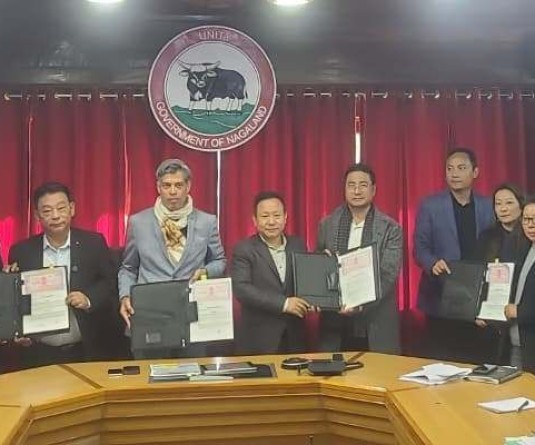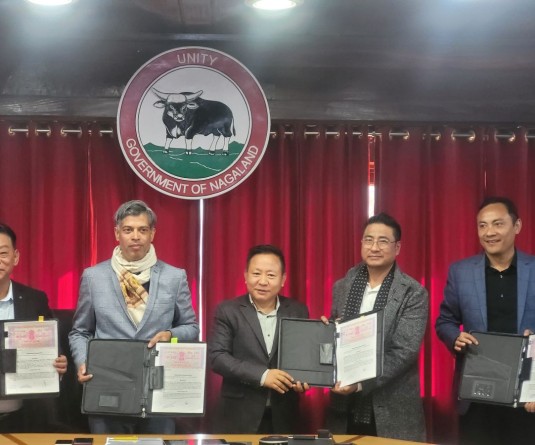
Morung Express News
Kohima | October 31
A Division Bench of the Gauhati High Court, Kohima Bench, has upheld a Single Judge’s decision that struck down the appointments of 38 Nagaland police personnel recruited in 2019–2020 without public advertisement.
The Bench, comprising Justice Sanjay Kumar Medhi and Justice Anjan Moni Kalita, dismissed an appeal filed by the affected individuals serving as Sub-Inspectors (SIs), Unarmed Branch Sub-Inspectors (UBSIs), Assistant Sub-Inspectors (ASIs), and Instructor Havildars.
The appeal had challenged a judgment passed by a Single Judge on September 26, 2024.
Original case
The September 26 case originated when a group of qualified aspirants filed a writ petition alleging that the 2019-2020 appointments were made through “backdoor entries” without public advertisement.
The petitioners cited an Office Memorandum dated July 7, 1976, which directs that no direct recruitment should be made without publicly inviting applications. They contended that the appointments violated Articles 14 and 16 of the Constitution, guaranteeing equality before the law and equal opportunity in public employment.
Following the same reasoning similar appointments of constables were quashed by the High Court on September 20, 2024, the Single Judge held that the appointments of the personnel were illegal and invalid from the beginning and directed the State Government to conduct a fresh recruitment process within six months.
The appointees were allowed to participate in the new selection with relaxation in age but not in physical standards.
In the constables’ case, the Supreme Court later dismissed a Special Leave Petition against that order in January 2025 and the Nagaland Police is currently undertaking a fresh recruitment process.
Appellants’ contention.
In their appeal, the appellants admitted that no advertisement preceded their recruitment but argued that their appointments were merely “irregular,” not “illegal,” and could be rectified. They claimed that urgent operational needs in policing sometimes required direct recruitment without advertisement.
Citing Rule 8 of the Nagaland Police Manual (Part III), they contended that the Director General of Police (DGP) and Inspector General of Police (IGP) were empowered to make direct recruitments in exceptional cases.
They also questioned the maintainability of the writ petition, alleging that two of the original petitioners had not consented to join the case and that the petition lacked bona fide intent. Further, they claimed the Single Judge’s order was based on concessions made by their counsel and the Advocate General without proper authorisation.
Additionally, they sought relaxation not only in age but also in physical standards during the fresh recruitment process, noting that they had already served in the force for several years.
Counter argument
Opposing the appeal, counsel for the original writ petitioners argued that the appointments were “illegal and unconstitutional,” not merely irregular. It was also submitted that the recruitment process without advertisement violated the basic principles of equality in public service and was void from inception.
The Counsel further argued that neither administrative convenience nor departmental discretion can override constitutional guarantees, pointing to Article 13 of the Constitution, which invalidates any order inconsistent with fundamental rights.
The counsel cited several Supreme Court judgments, including State of Karnataka vs. Uma Devi (2006) and Amrit Yadav vs. State of Jharkhand (2025), to assert that appointments made without advertisement are void in law.
The plea of “urgency,” was also countered as baseless since no evidence was presented to justify bypassing due process and even in genuine exigencies, appointments could only be temporary until proper recruitment was conducted.
On the issue of maintainability, the counsel stated that two petitioners had withdrawn under pressure, but as the writ was filed by 15 individuals, their withdrawal did not affect its validity.
Court’s ruling
The Bench observed that the maintainability issue was raised for the first time on appeal, noting that the appellants were duly represented before the Single Judge and their counsel had accepted that the case was covered by an earlier ruling.
Finding no proof that the counsel acted without instructions, the Court rejected claims of bad faith and confirmed that the writ petition remained valid despite two petitioners withdrawing, as it involved multiple parties and a matter of public interest.
Addressing the issue of legality, the Bench reiterated that the Supreme Court has clearly distinguished between illegal and irregular appointments. It noted that advertisement is a mandatory requirement for public recruitment.
“The requirement to have an advertisement before a public recruitment is a sine qua non and in absence of the same, all appointments made cannot but be held to be illegal and non est in law,” the Court held.
The Bench also ruled that administrative exigency cannot justify permanent appointments made in violation of recruitment rules.
Accordingly, the Division Bench held that the Single Judge’s findings were sound and did not warrant interference.
The appeal was dismissed, and the interim order of status quo was vacated.
The Court reaffirmed its direction to the State Government to conduct a fresh recruitment process, allowing the appellants to participate with relaxation in age but not in physical or educational qualifications.






